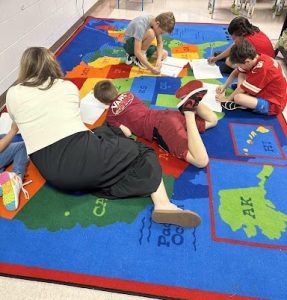Empowering ELL Students and Myself: One New Hampshire Teacher’s Micro-Credential Experience
CompetencyWorks Blog
This blog post is one of a series that highlights different experiences with the multilingual learner (MLL) micro-credential program developed by UCLA’s ExcEL Leadership Academy and highlighted in the Aurora Institute report: ExcEL Leadership Academy Micro-Credential Pathway Adoption in Rhode Island.
In today’s diverse classrooms, teachers face the challenge of ensuring every student receives a quality and equitable education. Who amongst us hasn’t wondered: Am I making informed choices about what each student needs? Do I represent diverse cultures from my community and encourage students to share theirs? How do I know if I have given a student the appropriate scaffold that allows them to access grade level curriculum, but does not provide a crutch that they cannot walk without? 
I certainly have asked these questions myself! Hi, I’m Caitlin Lomando. I am in my sixteenth year of teaching fourth grade in New Hampshire’s second-largest city, Nashua. Depending on where you are from, perhaps you are thinking, “Hmm…New Hampshire? Is there anything there besides mountains? Is the state even culturally diverse?” The answers to those questions would be: yes and yes, but not compared to other states. In fact, not only is New Hampshire becoming more diverse, but so are the needs of our students and families. Over my years teaching in Nashua, the number of English Language Learners (ELLs) in my class has increased, and I want and need to meet their needs and the needs of their families. I was lucky enough to join the ExcEL Leadership Academy in July 2023, and I can confidently say that its micro-credential program has had a great impact on me personally and professionally.
Feeling Empowered Through Flexible Learning Opportunities
Every child enters the classroom with a unique set of experiences and backgrounds. For ELL students, navigating a new language and culture can be both exciting and daunting. As an educator, it is my responsibility to foster an environment where diversity is celebrated and embraced. The first set of six micro-credentials gave me the essential skills necessary to learn best practices for serving ELLs, and apply them in my classroom. 
Importantly, the ExcEL program allowed me to work through the micro-credentials on my own time. I am a busy mom of three kiddos, and after school and weekends can be hectic! Being able to work through the micro-credentials when I had time was important to me. I was able to advance through my first six essential micro-credentials in four months or so. We live in a busy world and it can be intimidating to take on anything extra. But by putting the time needed into learning and reflecting on my own educational practices, I became a better teacher and teammate.
When the opportunity to complete the advanced set of micro-credentials came up, I knew I was all in. The knowledge that I was already gaining and had shared with my colleagues was invaluable. My students were making great gains, becoming more culturally aware, and learning deeper empathy and compassion for those around them. I was excited to try new techniques with my ELL students in class, and utilize best practices that work for all students.
Shifting Practice to Meet Students Where They Are
As a result of my learning through the ExcEL micro-credentials, I made improvements to many areas of my teaching practice. I am now sure to utilize culturally diverse materials in my classroom, send all notices and emails from school to families in their native languages, and provide effective scaffolds to allow ELL students to access grade level curriculum regardless of their language acquisition. Additionally, implementing more visual aids, hands-on activities, and collaborative learning opportunities became integral parts of my lesson plans.
 One exciting addition to my classroom this year was our study of the Day of the Dead (El Dia de los Muertos). A few students shared the importance of “ofrendas” in their culture and how they use marigolds and family photos to decorate their ofrendas. Through these firsthand student accounts and educational videos and books, some students got to share a part of their culture and others were exposed to the importance of the Day of the Dead in the cultures of some of their Hispanic classmates. We even made cross-curricular connections and created Day of the Dead Math Fact posters to hang in our hallway. Creating beautiful displays for our hallway helped students get to know each other better and teach others about what they had learned.
One exciting addition to my classroom this year was our study of the Day of the Dead (El Dia de los Muertos). A few students shared the importance of “ofrendas” in their culture and how they use marigolds and family photos to decorate their ofrendas. Through these firsthand student accounts and educational videos and books, some students got to share a part of their culture and others were exposed to the importance of the Day of the Dead in the cultures of some of their Hispanic classmates. We even made cross-curricular connections and created Day of the Dead Math Fact posters to hang in our hallway. Creating beautiful displays for our hallway helped students get to know each other better and teach others about what they had learned.
As an example of how I am better able to meet the needs of my ELL students, I had a student who entered my classroom as an emerging English learner. In the beginning of the year he wrote only in his native language. Throughout the year I worked on creating a strong relationship with him so he felt comfortable taking chances. We moved from writing in his native language to using English sentence starters. Then we went down to just a word bank. Finally, he would verbalize what he wanted to write to me and then write it. By the end of the year, he was writing in English and was so proud of the progress he had made!
These are just a few stories of how I changed my practice to positively impact my students. It reinvigorated my love of teaching and my students are fully immersed in the lessons, as well!
Navigating Classroom Pressures and Centering Students
Too often, classroom teachers feel the pressure of all that surrounds us. Pressure from the school board to teach the “right” things in the “right” ways. Pressure from administration to slow down and make sure students have their essential skills, but also to keep up with the academic pacing calendar. Pressure from parents who want to ensure their children are getting what they need. Pressure from coworkers who might have better results than you in data meetings. It can all seem like so much. But I think it’s important to work smarter, not harder.
By focusing on my work through the ExcEL Leadership Academy micro-credentials and reflecting upon it now, I realize that supporting ELL students isn’t just about teaching language. It is about empowering them to succeed academically and thrive as individuals. I dedicated my time and was willing to learn. The
ExcEL Leadership Academy gave me the information and tools that I needed to transform my classroom into a place where every student – regardless of background – feels seen, heard, and valued. We celebrate differences and learn from one another.
So, if you are sitting there thinking about what you can do to affect positive change in your classroom and engage in meaningful professional development, I cannot recommend ExcEL Leadership Academy highly enough. Taking all I have learned from ExcEL, I will continue to champion the needs of my ELL students (and all students) because I know the impact of that effort will outlive their short time in my classroom.
Learn More
- Educator Micro-Credentials: Better for My Learning and Better for Students
- Rethinking Learning Through Educator Micro-Credentials
- Personalizing Professional Learning to Increase Student Growth: Lessons from Lindsay Unified School District
 Caitlin Lomando is a seasoned educator with a passion for teaching. With 16 years of experience, she currently serves as a fourth grade teacher in New Hampshire. Caitlin holds certifications in K-8 and a masters in administration, reflecting her dedication to both classroom education and leadership. She was a 2024 New Hampshire Teacher of the Year Semi-Finalist. Caitlin is currently completing her advanced set of micro-credentials through ExcEL Leadership. Outside of her professional endeavors, Caitlin finds joy spending time with her family. She lives with her supportive husband, three young children, and two energetic cats. In her spare time she enjoys going to the beach, reading, and learning more about how to best support her students.
Caitlin Lomando is a seasoned educator with a passion for teaching. With 16 years of experience, she currently serves as a fourth grade teacher in New Hampshire. Caitlin holds certifications in K-8 and a masters in administration, reflecting her dedication to both classroom education and leadership. She was a 2024 New Hampshire Teacher of the Year Semi-Finalist. Caitlin is currently completing her advanced set of micro-credentials through ExcEL Leadership. Outside of her professional endeavors, Caitlin finds joy spending time with her family. She lives with her supportive husband, three young children, and two energetic cats. In her spare time she enjoys going to the beach, reading, and learning more about how to best support her students.
